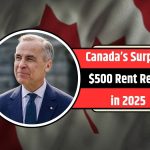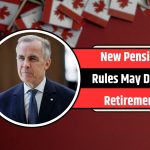With growing financial pressure on seniors and government-funded pension systems, debates around raising the retirement age and updating withdrawal rules have gained renewed urgency.
Rising inflation, longer life expectancy, and the sustainability of CPP and OAS are all driving the conversation. In this article, we explore what’s being proposed, why it’s happening, and how it could affect your financial future.
Why is Canada reconsidering the retirement age in 2025?
A set of powerful demographic and economic trends is forcing policymakers to rethink how and when Canadians retire:
- Aging population: By 2030, more than 20% of Canadians will be 65 or older, placing unprecedented strain on pension programs.
- Longer lives: Canadians are living longer, which means they’re drawing Old Age Security (OAS) and Canada Pension Plan (CPP) benefits for longer periods.
- Rising costs: Seniors are grappling with soaring costs for housing, groceries, and healthcare—making early retirement harder to afford.
- Pension strain: With more people retiring and fewer workers paying into the system, both CPP and OAS face sustainability challenges.
These pressures are prompting federal and provincial governments to explore reforms that might stabilize the system for the long term.
What proposals are being considered?
As of mid-2025, several key proposals are on the table. These are designed to make the retirement system more sustainable while offering more flexibility to retirees:
| Policy Proposal | Current Status | Proposed Change | Who’s Affected |
|---|---|---|---|
| Retirement Age | 65 | Gradual rise to 67 by 2030 | All workers under age 60 |
| Partial Pension Withdrawal | From age 60 | Flexible with part-time work | Early retirees |
| CPP Contributions (High Earners) | Flat rate | Higher rates for high earners | Upper-income Canadians |
| Pension Deferral Incentives | Optional bonus | Larger rewards for delaying | Seniors postponing retirement |
| Tax Credits for Working Seniors | Limited access | Expanded eligibility | Workers 65 and older |
The government is emphasizing flexibility and sustainability, aiming to reward those who can delay retirement while protecting those who cannot.
How could these changes affect you?
The impact depends largely on your age, income, and retirement plans:
If you’re aged 60–64:
You may face a longer wait for full pension benefits, unless you qualify under new flexible withdrawal schemes. However, you could still start CPP at 60 with reduced payments.
If you’re already retired:
Current payments will remain unchanged—at least for now. But indexing rules, bonus structures, or cost-of-living adjustments could evolve under new legislation.
If you’re under 50:
You’ll likely have to plan for a retirement age closer to 67, with higher contribution requirements during your career, especially if you’re in a high income bracket.
These proposals also raise questions for workers in physically demanding jobs. Many say raising the retirement age across the board could disproportionately harm lower-income Canadians, particularly those in trades, manufacturing, or rural communities.
How is the public responding?
Public opinion is deeply divided on the issue.
Canadians in professional urban sectors tend to support gradual increases, viewing it as a necessary adjustment to reflect longer lives. On the other hand, blue-collar workers, farmers, and tradespeople—especially those in physically intense roles—believe the plan is unfair.
Organizations like the Canadian Association of Retired Persons (CARP) have come out strongly against raising the retirement age, warning it could financially burden vulnerable seniors who are already struggling.
The political landscape is equally split. Some parties argue that reform is essential for long-term economic stability, while others call it a short-sighted move that ignores socioeconomic inequalities.
Will there be a compromise?
The likely outcome may not be a full retirement age hike for everyone, but rather a hybrid approach:
- Gradual retirement age increases for younger workers
- Flexible early withdrawal options for those in physically taxing jobs
- Stronger financial incentives for those who delay retirement
- Targeted tax credits for seniors who continue working
The goal appears to be a balanced reform—one that helps ease pressure on pension programs without penalizing Canadians who cannot reasonably work past 65.
What should Canadians do now?
Until final decisions are made, financial advisors and government agencies recommend Canadians proactively plan for a changing retirement timeline:
1. Review your pension forecast
Use tools like the My Service Canada Account to check how much CPP or OAS you’re projected to receive.
2. Save more if you can
Boost contributions to your RRSPs or TFSAs to create a stronger safety net if pension access is delayed.
3. Stay informed
Track legislative updates and official government communications closely, especially if you’re within 10 years of retirement.
4. Seek professional advice
If you’re nearing retirement or revising your plans, consult with a certified financial planner to explore all your options and strategies.
By planning now, Canadians can prepare for whatever shape the final pension reforms take in the coming years.
Why is this change happening now?
The government’s move is driven by a mix of financial urgency and demographic inevitability.
If no action is taken, the current structure of public pension programs may not be able to meet future demand. By gradually increasing the retirement age and encouraging older Canadians to stay in the workforce longer, the government hopes to protect the future solvency of CPP and OAS.
Yet, this comes with a social cost, particularly for those unable to extend their working years due to health, physical limitations, or job type.
FAQs
Q1. Is the retirement age increasing in Canada?
Not officially yet, but proposals suggest gradually increasing it to 67 by 2030.
Q2. Can I still withdraw CPP at 60?
Yes, but your monthly payments will be reduced if you take them early.
Q3. Will existing retirees lose any benefits?
No immediate changes are planned for those already receiving pensions.
Q4. Are there incentives for delaying retirement?
Yes. Larger deferral bonuses and expanded tax credits are part of the current reform proposals.
Q5. Who is opposing the proposed changes?
Groups like CARP, along with blue-collar and rural workers, are speaking out against a blanket retirement age hike.










